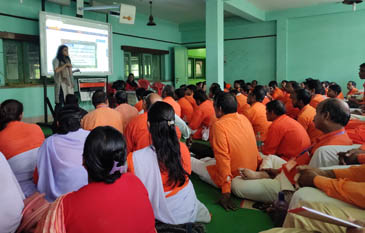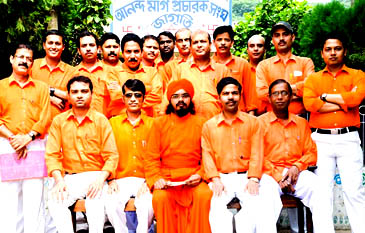Neo-Humanist, The Educational Philosophy of Ananda Marga School
Neo-humanist Education fosters love and respect for all, regardless of culture, religion, race or nationality and for animals and plants and the earth’s ecosystems. Children learn these principles both through lessons and teacher role-modelling as well as through developing their own intuitional feeling about the interconnectedness of all things.
Motto of Ananda Marga Neo-Humanist Education
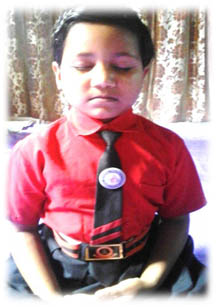
“Sa’ Vidya’ Ya’ Vimuktaye”
Education for Liberation – Physical, Mental & Spiritual”
According to Ananda Marga
Neo-Humanist Education,
The 'Education' Means
- E – Enlargement of mind
- D – DESMEP
- D – Discipline
- E – Etiquette
- S – Smartness
- M – Morality
- E – English
- P– Pronunciation
- U – Universal outlook
- C – Character
- A – Active habits
- T – Trustworthiness
- I – Idealization of the great
- O – Omniscient Grace
- N -Nice temperament
Aims and Objectives of the School
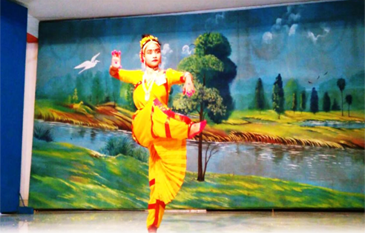
- To impart Neo-Humanist Education based on moral and spiritual values of human life.
- To promote the education system that which is a blending of occidental extroversial science and oriental introversial Philosophy, Ecological awareness, socio- economic consciousness and universal peace & harmony.
- Special attention is given to the provision of educational environment, children’s apparatus and teaching of English language, mother tongue and non-language subjects according to the scientific methodology evolved by the educational departments of Ananda Marga.
- Stu-Vol (Students’ Volunteers) course for Physical, Mental and Spiritual growth and development of child.
- PHYSICALLY-Basic knowledge for maintaining good health and active living.
- MENTALLY-The child should gain constant knowledge for expression and application in a changing world understanding nature and the world we live in.
- SPIRITUALLY–The child should have awareness of the creator and the divine wisdom of HIS creation. Loving caring and sharing attitudes for human beings, animals and plants. Child will focus on a positive outlook of life.
Management and Administration of School
The school is managed by Education, Relief and Welfare Section (ERAWS) of Ananda Marga Pracaraka Samgha through its structural supervisory workers, Teacher – in charge & Advisory Committee.
Neo-Humanist Education
Education in its etymological sense is a systematic and sustained effort to encourage and develop the best of one’s latent physical, mental spiritual qualities. It sets in a process of evolution wherein the lower and crudifying animalistic propensities are gradually eliminated and humans become fully human, and whom we may then describe as divine.
The true goal of education is that knowledge is meant for liberation – physical, mental and spiritual. Education in its proper denotation is hardly synonymous with book-knowledge or literacy. It is much wider in scope and denotation. It is the most potential medium to revolutionize the physical, mental and spiritual personality of human beings.
According to our founder Shrii Prabhat Ranjan Sarkar – “Educated are those who have learnt much, remembered much and made use of their leaning in practical life“.
Shrii P. R. Sarkar redefined the boundaries of education by applying a larger framework based on the philosophy of Neo-Humanism. Neo- Humanism basically means to encompass love for the whole of creation through a realization that everything is a manifestation of the creator.
Neo-Humanist education therefore emphasizes the importance of developing the whole child in order that he/she may realize their highest potential through developing a sense of social responsibility and spirit to the universal family.
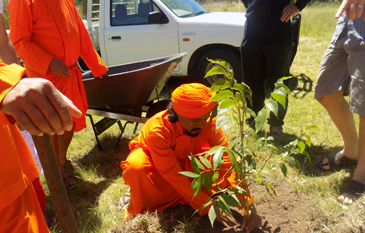
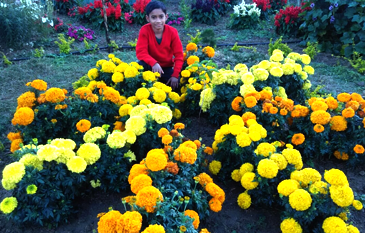
Neo-Humanist Education
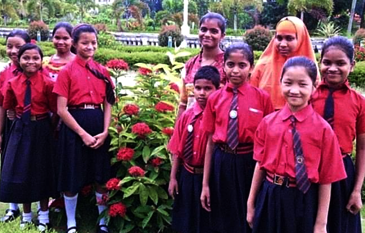
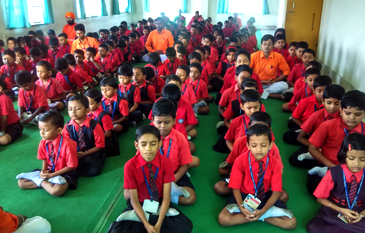
In spite of all the scientific achievements and advancements in all spheres of knowledge, humanity today is passing through a critical juncture of history. Selfishness, greed and apathy are dominating human psyche inviting complex problems and its own peril. Ananda Marga is striving towards heralding a new era of God-centered philosophy of Neo-Humanism where every creation is loved, respected and cared as the very expression of the same Supreme Consciousness.
The motto of Ananda Marga Education, as coined by its founder Philosopher Shri Prabhat Ranjan Sarkar is “Sa vidya ya vimuktaye” i.e education is intended for bringing all-round liberation of human life physical, mental and spiritual.
The guiding philosophy of Ananda Marga schools is Neo-humanist Education. Neo-humanism is the philosophy of the innate oneness of all things. Studying about the “web of life” helps one to understand the interconnections between self, others and the natural environment.
Neo-humanist Education fosters love and respect for all, regardless of culture, religion, race or nationality and for animals and plants and the earth’s ecosystems. Children learn these principles both through lessons and teacher role-model as well as through developing their own intuitional feeling about the interconnectedness of all things.
Aims and Ideals of Neo-Humanist Education
- To develop the full potential of each child: physical, cognitive, emotional, moral,social and spiritual.
- To awaken a thirst for knowledge and love of learning.
- To equip students with academic and other skills necessary for higher education.
- To facilitate personal growth in areas such as morality, integrity, self-confidence, self-discipline, positive attitudes and cooperation.
To develop physical wellbeing and mental capabilities through yoga and concentration techniques, sports and play. - To develop a sense of aesthetics and appreciation of culture through drama, dance, music and art.
- To encourage students to become active, honest and responsible members of society.
- To promote an awareness of ecology in its broadest sense (i.e. the realization of the inter-connectedness of all things) and to encourage respect and care for all living beings.
- To encourage a universal outlook, free from any discriminatioTo recognize the importance of teachers and parents in setting an example.n based on religion, race, caste, creed or gender.
- To recognize the importance of teachers and parents in setting an example.
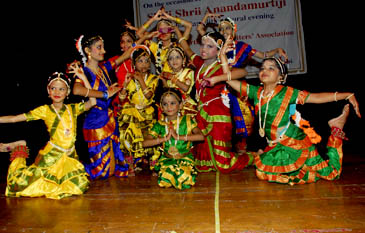
Some General Principles of Neo-Humanist Education
1. Integrated development of the whole personality
Neo-humanist Education facilitates the integral development of all aspects of the human personality: body, senses, intellect, imagination, intuition and spirit. It emphasizes not only the content of thought – the subject matter – but the very process of thinking itself, to develop methodical thought processes and creative intelligence. This provides a harmonious balance between academic learning, its application, creativity and inner growth to awaken the highest potential in every child.
2. Value-oriented curriculum
Universal moral values form the basis of an emotionally-balanced and discrimination free individual life and a truly harmonious and cooperative human society. Neo-humanist Education employs a comprehensive approach for imparting these values throughout all phases of school life and curriculum. The classrooms become moral communities in which the teacher serves as a role model, caregiver and mentor. Students deepen their own moral understanding through study and discussion, self-reflection, cooperative learning, conflict resolution and community service. This constant nurturing of moral values allows children to confront the moral challenges of today’s society and to grow into exemplary human beings who both respect and take responsibility for all members of their universal family.
3. Spiritual oneness as the goal of life
The entire learning process is rooted in the conviction that the universe is an integrated whole in which everything is connected. In contrast to the separation and fragmentation that prevails in the contemporary world, the realisation of this oneness fosters a deep sense of connection to self, to others, and to all of life. Based on the current paradigm shift from a mechanistic, materialistic view of the universe to a new vision of wholeness and interdependence, the entire curriculum helps the students rediscover the meaning and purpose of existence. An education that values their inner, subjective world instills in students a profound respect for the mystery of life and a commitment to care for all creation.
4. Integrated approach to learning
Instead of fragmenting knowledge into narrow and isolated academic disciplines, Neo-humanist Education encourages the students in an active, multi-sensory and multi-disciplinary exploration of the world around them. Learning is a process, not a product: it is not merely an accumulation of objective facts, but rather seeing the world as a dynamic whole composed of a myriad of interrelated phenomena. Child-directed play in the early grades and self-chosen projects in later years stimulate a thirst for knowledge and a joy of learning which will remain with the children throughout their lives.
5. Progress in all disciplines
The subtle expression of beauty in music, art, literature and other aspects of life uplift the human mind and nurture a deeply institutional awareness of the oneness of all. This universalist love for all created beings is the essence of Neo-humanism. In Neo-humanist Education, aesthetic appreciation and experience suffuse all aspects of learning. The classroom environment is aesthetically vibrant and integrated with artistic activity: painting, sculpture, drawing, music, dance, mime and drama. The curriculum also includes systematic training to develop the creative imagination of the right brain through fantasy, guided imagery and metaphoric thinking. This training not only develops the child’s creativity, but also enhances learning and academic performance and builds character by fostering a greater ability to empathize with others.
6. Blending of local culture and universal vision
Neo-humanist Education emphasizes the teaching of local languages and cultural traditions hand-in-hand with the inculcation of a universalist outlook. Deepening our understanding of our culturo-linguistic heritage develops our strength of character, while ignorance or neglect of our cultural roots makes us vulnerable to suppression and exploitation. Neo-humanist Education also fosters an appreciation of the magnificent diversity of human experience, for our diverse cultures form the flowers of the garland of a universal human society which transcends caste, creed, colour and race. Through a multicultural curriculum, students realize that this universe is all of ours; humans, animals, plants and the inanimate world. Only through such a universal outlook can we move collectively towards a global future of harmony and peace.
7. A new environmental consciousness
Environmental education must not merely impart the values and skills necessary for responsible stewardship of our planetary resources (organic agriculture, waste recycling, renewable energy, land and water management etc.); it must also help the children develop an intimate living relationship with the web of life around them. Through intensive study of the local area, with its complex cycles and interdependencies, the students will naturally replace linear and analytic thought processes with the synthetic cyclical thinking that is essential for a sustainable society of the future. A more subtle environmental education will develop an entirely new consciousness that experiences on the deepest level of being a sense of wonder at the beauty and harmony of the world and a feeling of kinship with all life.
8. Exemplary role of the educator
In Neo-humanist Education, the role of the teacher is of paramount importance, for teaching requires a subtle blending of institutional insight, creative sensitivity, and scientifically grounded practices. Teachers must embody the noblest qualities of humanity: selflessness, strength of character, leadership and love for all life. They must constantly cultivate their own inner selves and therefore invite a co-learning, co-creating process with the students. They are the counselors and friends who treat each individual with special respect and affection. They facilitate the unfolding of the creative learning process by being attentive to the needs and abilities of each child. Teachers have the power to transform the students by their own example and loving guidance; to nurture the highest aspirations of the human spirit.
9. Inculcation of the spirit of service
Neo-humanist Education imparts a sense of responsibility to children: the sense that education is not a passport to privilege but a sacred responsibility to serve others. Thus the spirit of service is inculcated in the children from their earliest years by fostering a sense of compassion that makes them want to alleviate the suffering of others. Through loving and caring interactions with their surrounding bio-community, through service projects and stories, skill-development and self-discipline, they are encouraged to work not only for themselves but for all members of their universal family.
10. Social justice and upliftment
Society in the true sense means individuals moving together towards a common goal, with no one lagging behind. Neo-humanist Education encourages students to develop an awareness of social problems and equips them with the practical skills to solve them. They are thus inspired to work for social justice and for the upliftment of the neglected all over the world. A curriculum that liberates the intellect from dogmas and subtle forms of psychic exploitation instills in the students the conviction that change is possible and offers them the tools to create that change.
Methodology of Neo-Humanist Education
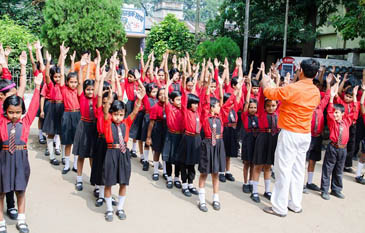
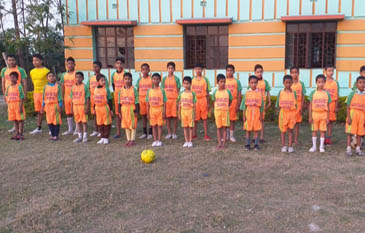
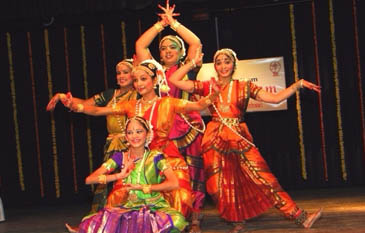
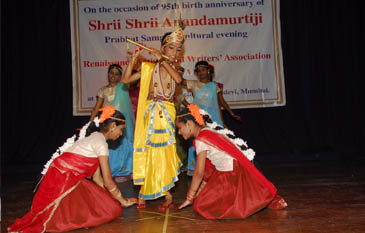
For physical development:
- Inculcating practical habits of preventive self-health through proper diet, yoga asanas and personal hygiene.
- Imparting curative techniques of alternative medical therapies (medicinal plants, naturopathy, acupressure massage, etc.).
- Competitive and cooperative games and exercises to develop discipline, initiative, leadership, cooperation and active habits.
- Participating in individual and group dancing to develop rhythm and grace, and collective spirit.
- Exercises and crafts to develop fine motor coordination and respect for the mundane world.
- Sensory exercises and games to sharpen the senses.
- Aesthetic learning environments to awaken creativity and thirst for knowledge in the students.
- Practices for personal and environmental safety.
For cognitive development:
- Acquiring knowledge in all spheres of life through analytical study and problem-solving, exploration and experimentation.
- Techniques to develop memory (repetition, association, visualisation and ideation), concentration, methodical thinking and rationality.
- Practical training in transforming psychic energy and enhancing positive thinking and self-esteem.
- Bio-psychological techniques to develop emotional equilibrium and higher order thought processes.
For moral development:
- Dramas, songs, moral dilemmas, games, stories and other literary forms to inspire
- A natural morality in the students.
- Moral examples of teachers of high integrity.
- Reinforcement of moral behaviour.
- Ethical values underlying all disciplines.
- Recitation of moral aphorisms.
- Ideational techniques by teachers and students to transform non-moral attitudes.
- Cooperative learning and conflict resolution.
- Creation of a moral community in the school.
For creative development:
- Training in the arts (music, theatre, painting, modelling, crafts, etc.) and their utilisation in all other disciplines to enhance learning.
- A natural morality in the students.
- Use of fantasy through stories and drama.
- Techniques of metaphoric and lateral thinking.
- Training in visualisation skills.
For intuitional and spiritual development:
- Elevating music, song and dance.
- Mind-expanding techniques of concentration and relaxation (‘quiet time’).
- Systematic exercises in deep-breathing and sensory withdraw.
- Concept of interconnectedness underlying curriculum design.
- Experiences of oneness with nature.
- Spiritual stories and dramas.
- Inspiration of the teacher.
For social and environmental development:
- Service projects in the local community.
- Lessons/discussions about social justice and human rights.
- Environmental excursions and campaigns.
- Inculcation of sense of responsibility through schools duties.
- ‘Child-to-child’ programs (children teaching other children).
- Vocational skills developed and applied in community service.
- Communication and group dynamics exercises.
- Leadership training.
Qualities of Ananda Marga School Teachers'
The role of teachers in our society is a paramount importance, as it is the young children who will be the leaders of tomorrow. Children learn very quickly, and everything is easily assimilated by their inquisitive and absorbent minds. As such, the exemplary role of educators is of vital importance, as they themselves are setting the example for the children.
The necessary qualities of any teacher are:
• An innate love and compassion for all humanity
• A genuine love and affection for children
• Moral integrity and righteousness
• Dedication to the all-round development of the child
• Self-restraint of behaviour and temper
• Decency of personal behaviour
• Discipline, punctuality and dutifulness
• Strong character
• Inspiring personality
• Leadership ability
• Good judgement and balanced mind
• Academically qualified
• Able to conduct a cooperative and communicative relationship with the parents
• Free from the influence of political or other vested interests
• Possessing a spirit of selfless service to the society
• Teaching by personal behaviour and example
